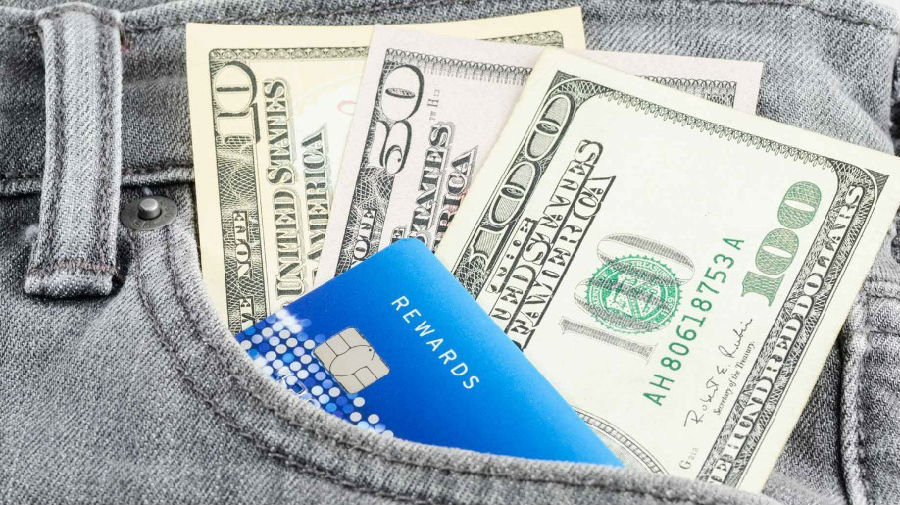This is Brian Kelly. You'll often find him traveling.
这位是布莱恩·凯利,你会发现他经常都在旅游。
I've been to Ghana now ten times.
加纳我已经去过十次了。
And I got to visit Liberia.
利比里亚也去了。
Took my parents to South Africa.
还带我父母去了南非。
I love flying Emirates first class — it's gaudy, it's gold. You get caviar.
我喜欢坐阿联酋航空公司的头等舱出行——因为很华丽,金碧辉煌的,还有鱼子酱吃。
And I have never paid for it.
而且都没花过我一分钱。
So Brian traveled to all these places basically for free.
所有这些地方布莱恩几乎都是免费去的。
And he did it using credit card rewards.
秘诀就是信用卡福利。
Banks promise offers like cashback, bonus miles, and cash bonuses to get you to sign up and spend.
为了让消费者注册并使用信用卡消费,银行会承诺返现、奖励里程和现金奖励等开卡福利。
And it's rewards like these that people like Brian have become masters at maximizing.
如何将这种福利最大化,布莱恩等人是最清楚不过的了。
Ultimately though, someone is paying for these credit card rewards.
不过,归根结底,还是有人要为这些信用卡奖励买单的。
And there's a hidden battle going on over their future.
而且,关于这些福利的未来,一场暗战已经在悄然上演。
During the Great Recession, some of the biggest US banks — Wells Fargo, JP Morgan and Bank of America — had a problem.
“大萧条”期间,美国几家规模首屈一指的银行——富国银行、摩根大通和美国银行——都出现了一个问题。
They weren't making as much money from mortgages.
抵押贷款已经不那么赚钱了。
So they shifted their business to credit cards.
于是,他们将业务转向了信用卡领域。
And in order to get customers to sign up and spend on their cards they offered bigger and better rewards.
为了让顾客注册并用信用卡消费,他们推出了比抵押贷款更大更好的奖励措施。
"In 2011 we saw our first ever 100,000 point offer, Chase offered on a British Airways Visa.
“2011年,我们首次收到了10万分的里程赠送,是大通银行联合英国航空公司的推出的信用卡提供的。
100,000 points for a credit card. Wild!
办一张信用卡就能获得10万分的积分。惊不惊喜,意不意外?
And really I think what JP Morgan/Chase was doing was thinking
而我认为摩根大通之所以这么做,是因为他们想
we gotta focus more on consumer lending and not just on that corporate lending or even mortgages.
更多地关注针对消费者的贷款,而不仅仅是公司贷款或者抵押贷款。
As banks expanded rewards, more people starting using rewards cards.
随着银行扩大开卡奖励,越来越多的人也开始使用这种奖励卡了。
By 2018, 92% of all credit card purchases were made on rewards credit cards.
到2018年,92%的信用卡消费都是通过奖励信用卡完成的。
That's up from just 67% in 2008.
而2008年的时候,这一比例才67%。
But it's not the banks that ultimately pay for these rewards.
然而,最终为这些奖励买单的并不是那些银行。
So when a customer uses a credit card to buy something,
顾客用信用卡购物时,
the store is charged what's called an interchange fee.
商店会被收取一定的“手续费”。
That fee is a percentage of the total sale.
这笔费用也算在商店的销售额里。
It's the bank that issued the card collects the interchange fee.
收取手续费的是信用卡发卡行。
And it's this money that they heavily rely on to pay for cardholder rewards.
发卡行也主要依赖这一收入来给持卡的消费者提供奖励。
They're making money on your annual fee and on interest.
他们是会靠你的年费和利息赚钱啦。
But the big way with these premium credit cards is the interchange fee.
不过大头还是零售商交的手续费。
That's the bread and butter.
这才是奖励型信用卡收入的主要来源。
Interchange fees aren't the same across all credit cards.
不同信用卡的手续费也不相同。
Cards with low rewards typically have an interchange of about 1.5% of the purchase price,
奖励力度较小的(普通)信用卡的手续费通常为交易金额的1.5%左右,
while cards with bigger rewards can have an interchange fee of nearly 3%.
而奖励力度较大的信用卡的手续费可以达到近3%。
And the divide between these two types of cards has increased.
而(近年来)这两种手续费的差距还在逐步扩大。
Banks can make about $0.25 more per average purchase if the customer uses a premium rewards card over a basic one.
如果客户使用奖励型行用卡而非普通信用卡,一笔交易银行平均就能多赚0.25美元。
In 2017, retailers paid card issuers $43.4 billion dollars in interchange fees.
2017年,零售商共向发卡行支付了高达434亿美元的手续费。
So it's no surprise that stores aren't a huge fan of these credit card rewards.
所以,商店不喜欢这些信用卡奖励也就不足为奇了。
They don't really want to pay for your free trip to South Africa.
他们并不想为你的免费南非之旅买单。

Most stores don't have negotiating power over these interchange fees.
大多数商店在这些手续费上都没有跟银行讨价还价的能力。
Payment networks like Visa and Mastercard require them to honor all cards"
维萨和万事达等支付体系都要求零售商们“对所有的信用卡一视同仁”,
which means they have to accept both low fee and high fee credit cards.
这也就意味着,手续费低和手续费高的信用卡他们都得接受。
And as a result, some stores reported that they've increased retail prices in order to make up for the cost of accepting credit cards.
一些商店报告说,为此他们会用涨价来弥补接受信用卡产生的额外成本。
Which means even if you don't have a rewards credit card, you may still be paying for those rewards.
这也就意味着,即使你没有用奖励信用卡,你可能也要为它们的奖励活动买单。
So if you're paying cash, you're basically paying for my points.
言下之意,如果你是用现金结账的,那你基本上也是在为我的积分买单。
So it can be argued that people who can't obtain credit,
所以,可以说,那些没有办到信用卡的人,
you know, those with lower incomes, are basically funding the system for others.
也就是那些收入较低的人,基本上是在替其他人为这个体系买单。
Others will say, well the merchants get paid more, they get paid on time, there's less theft when people use credit cards.
其他人会说,得到更多酬劳的是那些商家,他们能够按时拿到报酬,人们使用信用卡时偷窃行为也减少了。
So it's an interesting ecosystem.
总而言之,这是一个很有意思的生态系统。
I won't get into the ethics but I will maximize my part of it.
我不会去讨论这里面的道德规范,但我会最大限度地发挥我的作用。
Some major retailers have indicated that they'll challenge the "honor all cards" rule
一些主要零售商表示,他们拒绝接受“所有信用卡一视同仁”这一规则,
so that they can reject cards with higher fees.
这样他们就可以拒收手续费更高的信用卡了。
And if stores succeed at driving down interchange fees,
如果商店成功降低了手续费,
banks are likely to respond by chopping rewards.
银行很可能就会削减奖励。
This isn't a hypothetical outcome.
这并不是一个假设的结果。
When credit card interchange fees were capped at .3% in Europe, banks responded by cutting rewards.
当欧洲的信用卡手续费上限为0.3%的时候,银行就曾作出削减奖励的反应。
For now, with so many credit card rewards out there,
如今,信用卡的奖励活动五花八门,
it's hard to know which deals are better than others.
要弄清哪些信用卡更好并不容易。
But with the cost of these rewards built into the things that we buy everyday,
不过,既然这些奖励的成本都算到了我们日常购买的商品里,
just using a rewards card at all can be beneficial.
那么,用奖励型信用卡总归是不会吃亏的。
If you're using a debit card or god forbid, cash, for purchases,
而用借记卡或现金购物,
you're literally leaving points and money on the table.
就无异于饭到嘴边都吃不到嘴里。
It's like throwing money away every time you use cash.
而你每次用现金支付也如同把钱白白拿去打水漂。
So get debt free, get disciplined with your finances, put your expenses on each month,
所以啊,大家还是赶紧还清债务,管理好自己的财务,攒好每个月的开支,
pay them off, earn the points, and avoid interest.
老老实实还清,把积分挣到手,避免自己白交那些利息吧。
That's how you win at the points game.


